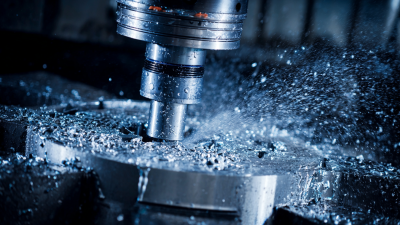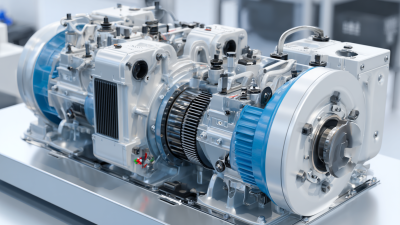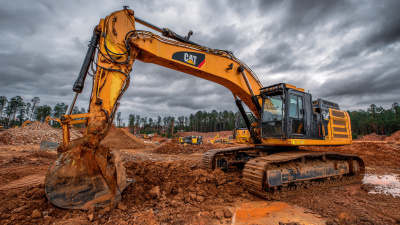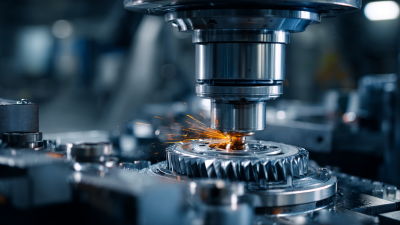What is the Impact of Mechanical and Electrical Engineering on Modern Industries
 The fields of mechanical and electrical engineering are cornerstone disciplines that have significantly shaped modern industries, driving innovation and efficiency across various sectors. According to a report by the International Federation of Robotics, the global market for robotics and automation systems is expected to reach $210 billion by 2025, largely fueled by advancements in these engineering sectors. Furthermore, the World Economic Forum highlights that investments in mechanical and electrical engineering technologies can lead to a productivity boost of up to 30% in manufacturing. As businesses increasingly adopt automated solutions and smart technologies, understanding the impact of mechanical and electrical engineering becomes crucial for harnessing their full potential. This blog will explore how these engineering disciplines are transforming industries, enhancing productivity, and shaping the future of work in an ever-evolving technological landscape.
The fields of mechanical and electrical engineering are cornerstone disciplines that have significantly shaped modern industries, driving innovation and efficiency across various sectors. According to a report by the International Federation of Robotics, the global market for robotics and automation systems is expected to reach $210 billion by 2025, largely fueled by advancements in these engineering sectors. Furthermore, the World Economic Forum highlights that investments in mechanical and electrical engineering technologies can lead to a productivity boost of up to 30% in manufacturing. As businesses increasingly adopt automated solutions and smart technologies, understanding the impact of mechanical and electrical engineering becomes crucial for harnessing their full potential. This blog will explore how these engineering disciplines are transforming industries, enhancing productivity, and shaping the future of work in an ever-evolving technological landscape.
The Role of Mechanical Engineering in the Evolution of Manufacturing Processes
Mechanical engineering has played a pivotal role in the evolution of manufacturing processes, revolutionizing how products are designed, produced, and delivered. With the advent of advanced machinery and automation, mechanical engineers have developed innovative techniques that enhance efficiency and precision in manufacturing. From traditional assembly lines to modern robotics, the integration of mechanical engineering principles has optimized production cycles, reduced costs, and improved product quality.
The shift towards lean manufacturing and sustainable practices has further emphasized the importance of mechanical engineering in modern industries. Engineers continuously seek ways to minimize waste and energy consumption while maximizing productivity. By implementing computer-aided design (CAD) and simulation tools, they can create more effective manufacturing processes that respond rapidly to market demands. As industries increasingly focus on sustainable development, mechanical engineers are at the forefront, designing systems that not only improve efficiency but also reduce the environmental impact of manufacturing activities.
What is the Impact of Mechanical and Electrical Engineering on Modern Industries - The Role of Mechanical Engineering in the Evolution of Manufacturing Processes
| Engineering Discipline | Impact Area | Advancements | Significance |
|---|---|---|---|
| Mechanical Engineering | Manufacturing Processes | Automation and Robotics | Increased efficiency and reduced labor costs. |
| Electrical Engineering | Control Systems | Smart Manufacturing Technologies | Enhanced precision and adaptability in production. |
| Mechanical Engineering | Product Design | Computer-Aided Design (CAD) | Improved design accuracy and faster prototyping. |
| Electrical Engineering | Energy Efficiency | Renewable Energy Systems | Sustainable manufacturing practices and cost savings. |
| Mechanical Engineering | Material Science | Advanced Material Development | Stronger, lighter materials leading to innovation. |
How Electrical Engineering Is Driving Innovation in Sustainable Energy Solutions
The intersection of electrical engineering and sustainable energy solutions is profoundly reshaping modern industries. According to the International Energy Agency (IEA), renewable energy sources are expected to account for 30% of the global energy mix by 2025. This shift is largely driven by innovations in electrical engineering, which enhance energy efficiency and grid reliability. Technologies such as smart grids and energy storage systems are revolutionizing how energy is generated, distributed, and consumed, making it easier for industries to adopt greener practices.
Tip: To stay ahead in sustainable energy innovation, industries should invest in R&D for smart technologies. Implementing advanced sensors and IoT devices can optimize energy use and minimize waste, leading to cost savings and improved sustainability.
Moreover, electrical engineers play a crucial role in developing systems that integrate renewable sources like solar and wind into the existing energy infrastructure. By leveraging advancements such as photovoltaic materials and energy management software, companies can significantly reduce their carbon footprint. A report by Bloomberg New Energy Finance projects that investment in solar energy could reach $3 trillion by 2040, highlighting the critical role of electrical engineering in harnessing sustainable energy.
Tip: Industries should consider collaborating with tech startups that specialize in renewable energy. Such partnerships can drive innovative solutions and accelerate the transition towards a more sustainable energy landscape.
The Impact of Electrical Engineering on Sustainable Energy Solutions
The Impact of Automation Technologies on Production Efficiency
The advent of automation technologies has revolutionized production efficiency across various modern industries. By integrating mechanical and electrical engineering principles, companies can streamline their operations, reduce human error, and enhance overall productivity. Automated systems enable precise control over manufacturing processes, leading to faster turnaround times and significant cost savings. The application of robotics, AI, and IoT (Internet of Things) in manufacturing not only boosts output but also allows for real-time monitoring of machinery, which is crucial for predictive maintenance and minimizing downtime.
Tip: Implementing automation doesn't have to be all at once. Start with pilot projects to assess how specific technologies can improve your workflows before scaling them up across the organization.
Furthermore, the synergy between automation and data analytics enables industries to make informed decisions based on real-time data insights. This leads to better resource allocation and more efficient supply chain management. As companies increasingly rely on these advanced technologies, they find themselves equipped to adapt quickly to market changes and consumer demands.
Tip: Regular training for employees on new technologies can enhance adaptability and ensure everyone is on board with the changes, maximizing the benefits of automation.

The Influence of Robotics on Modern Supply Chain Management
The influence of robotics on modern supply chain management cannot be overstated. Automation through robotic systems enhances efficiency by reducing human error and speeding up production processes. Robots can work round the clock, optimizing workflows and ensuring that goods are delivered on time. This technological integration allows companies to maintain a competitive edge, as they can meet consumer demands promptly while minimizing operational costs.
Tips for implementing robotics in supply chain management include starting with a thorough assessment of current processes. Identify bottlenecks or areas where robots could significantly improve efficiency. Additionally, fostering an adaptable workplace culture is crucial; employees should be encouraged to embrace technology as a tool that enhances their roles rather than a threat to their jobs.
Moreover, investing in training programs for staff is essential. Employees need to understand how to work alongside robotic systems and leverage their capabilities for better outcomes. Continuous improvement should also be a priority, with businesses regularly evaluating the effectiveness of their robotic systems and making adjustments based on performance metrics. By strategically integrating robotics into supply chains, companies can better navigate the complexities of modern industry demands.
Recent Advances in Mechanical and Electrical Engineering and Their Economic Implications
Recent advancements in mechanical and electrical engineering have transformed modern industries, fueling innovation and enhancing efficiency across various sectors. The integration of automation and robotics in manufacturing processes has enabled companies to increase production rates while simultaneously reducing labor costs. For instance, advanced robotic systems can now perform intricate assembly tasks with precision, minimizing human error and improving product quality. Additionally, the Internet of Things (IoT) has emerged as a game-changer, allowing for real-time monitoring and data analysis, which optimizes operational performance and resource management.
Moreover, the development of energy-efficient technologies is revolutionizing industries such as construction and transportation. Electrical engineering innovations, including smart grids and renewable energy systems, play a crucial role in reducing energy consumption and promoting sustainability. These advancements not only lower operational costs for businesses but also contribute to the overall economic growth by creating jobs in emerging fields. As mechanical and electrical engineering continues to evolve, its economic implications will undeniably shape the landscape of modern industries, fostering a competitive edge in a rapidly changing global market.

Related Posts
-

CNC Precision Engineering Versus Traditional Machining A Comprehensive Comparison
-

Maximizing Savings with Superior After Sales Support for Best Mechanical Electrical Solutions
-

Top Strategies for Maximizing Efficiency with Best Civil Engineering Machines
-

The Evolution of Civil Engineering Machines Shaping Tomorrow's Infrastructure
-

Exploring the Essentials of Auto Mechanical Engineering Processes
-

The Future of Best Mechanical Manufacturing Innovations and Trends
